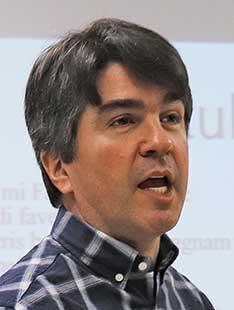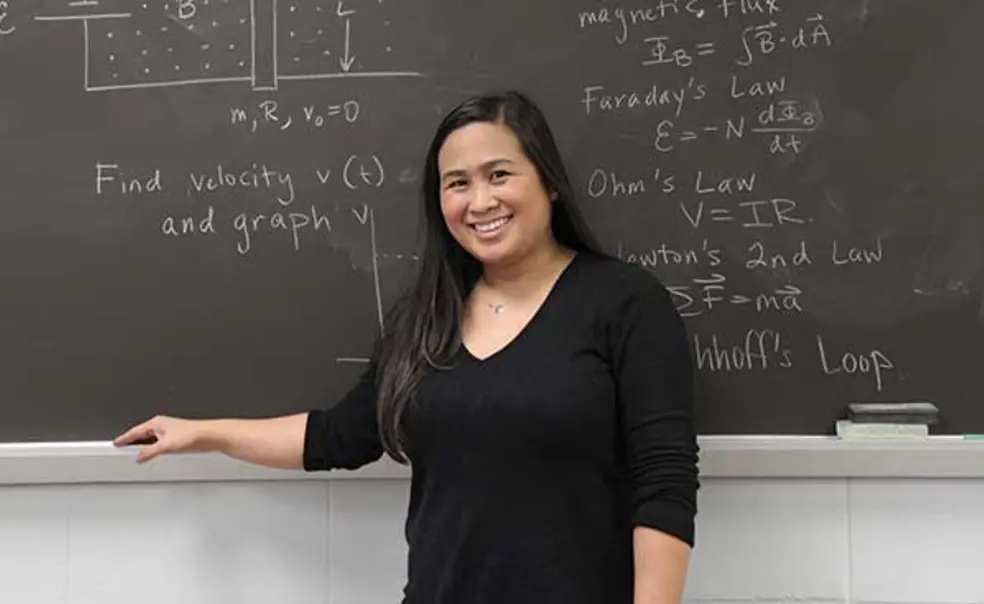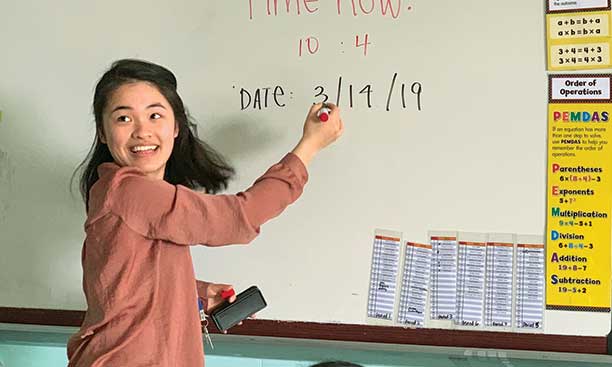Serving by Teaching
Turning 50, Teacher Prep has trained more than 1,000 to work with students
Across the state, from Trenton to North Jersey, a tenacious group of Princetonians is reporting for duty in a unique classroom. They’re students — and soon-to-be teachers.
After years of coursework, fieldwork, and student teaching, this pack of undergraduates, graduate students, and alumni will have the opportunity to earn a teaching license (a Certificate of Eligibility with Advanced Standing), to teach full time in middle and high schools in New Jersey, as well as in many schools nationwide.
“I loved my teachers, but I found that I was rarely taught by a teacher who looked like me, a black girl,” said Pam McGowen ’20, a student in the Program in Teacher Preparation (Teacher Prep) who plans to teach high school English someday. “This has pushed me to work to become a role model for students of color, because I believe that representation is important.”
Now more than 1,000 graduates strong, Teacher Prep was created with the support of then-Provost William Bowen *58, later Princeton’s 17th president. The program received state approval in 1969 and earned national accreditation in 2007. Ten to 15 students are certified every year, with 45 to 55 students in the program at any one time. In the past five years, 30 percent of Teacher Prep graduates were alumni. A third of graduates earned a teaching certificate in English, a quarter in social studies, and about a tenth each in math, science, and world languages.
“We see education as a way to help others improve their lives and increase their opportunities,” said Teacher Prep director Todd Kent. “There’s more emphasis on that in terms of access and equity these days,” he said, but the heart of the program is unchanged: to support students and alumni who begin this journey.
Surveys conducted by Teacher Prep have found that 74 percent of its alumni have been teachers, and 60 percent were working in the field of education (including teaching) at the time of the surveys. Public schools accounted for 58 percent, independent or religous schools 37 percent, and public charter schools 5 percent of first teaching jobs. Nearly three-fifths have taught in suburban schools, a third in urban schools, and less than 10 percent in rural areas.
To celebrate its 50th anniversary, Teacher Prep is convening a campus conference April 12 and 13. In the stories below, graduates reflect on the program’s role in their lives.
BARBARA FORTUNATO ’98
“I wasn’t planning on being a teacher,” Barbara Fortunato ’98 said. After graduating with a degree in electrical engineering, she set up shop in New York’s financial district. But the events of 9/11 — and its aftermath — stayed with her.
“I decided that I wanted to make a change in my career where I would feel that I was more directly giving back to the world,” she said. She enrolled in Teacher Prep and served her student-teaching post as a physics teacher at West Windsor-Plainsboro High School. It’s a job she cherishes to this day.
“Instead of money, I earn a sense of satisfaction that I never had when I was working on Wall Street.”
— Barbara Fortunato ’98, physics teacher
Still, her decision to leave Wall Street behind and take up teaching has raised eyebrows among her Princeton classmates. Some told her they might consider teaching only after they retire, “as if teaching may not be a profession worthy of a first career,” she said.
“I do not think about it very often, but I make a fraction of what they make,” Fortunato said. “But I still make a good living as a teacher, and I feel that I have everything I need, and most of the things I want. Instead of money, I earn a sense of satisfaction that I never had when I was working on Wall Street.”
JULIE KWONG ’16
“I always envisioned myself as the math teacher who continually pushed students to think in different ways and grow a love for math,” said Julie Kwong ’16, a first-generation college graduate who teaches algebra and AP calculus at MESA (Math, Engineering, and Science Academy) Charter High School in Brooklyn.
Now her focus has evolved: She aims to meet students where they are, whether they come to class with knowledge gaps or need “behavioral resets.” She tries to engage the entire classroom, including the quiet students.
“A teacher is someone who opens doors for learning to happen,” Kwong said. She tries to be a role model who “facilitates learning and guides students to develop lifelong questioning and critical-thinking skills,” she added.
Kwong never expected to work at a charter high school, but during her interviews, her future changed. “The world of charter schools is as diverse as the world of public schools,” she said.
“My students teach me daily about trust, consistency, and respect,” Kwong said. Learning difficulties are built over time, she added, and many students were never taught how to be an effective learner. But this can be challenged with patience and compassion, she said. Confidence, courage, and grit can be taught, too.
NOLIS ARKOULAKIS ’88

“About a year ago, I stepped back from the day-to-day practice of clinical medicine,” said Nolis Arkoulakis ’88, who teaches Latin at Princeton High School. After two decades as a plastic surgeon, his days now revolve around a language that has long been close to his heart.
Growing up, Arkoulakis spent most summers with his family in Greece, and took his first Latin class in middle school. At Princeton, he majored in classics, and he continued his studies in a master’s program at Oxford. Then came medical school and a career as a surgeon — but he felt there was “some unfinished business.”
It all began during his 25th reunion. “There was an ad from Teacher Prep in PAW encouraging alumni to get their teaching certificate,” he said. “A phone call was made the following Monday.”
Arkoulakis took one class at a time and served as a student Latin teacher at Princeton High School. He taught in the morning and saw his patients later in the day. “I kept coming back because it was all so interesting, but I really had no agenda in terms of changing careers. It was just tremendous fun,” he said.
After Teacher Prep, the school offered him an opportunity to teach full time. “I was very lucky to be offered this spot,” he said. “Teaching is a tremendous privilege because you are invited to share in your students’ lives, and hopefully help them in some real way.”
DIVYA FARIAS ’15
LEKHA KANCHINADAM ’15
Divya Farias ’15 and Lekha Kanchinadam ’15 moved to Oakland, Calif., a year after graduating to teach in the public school system. Now, they’re roommates — and in February, they walked school picket lines together.
Farias, a special-education teacher who works with sixth- and 10th-graders at Coliseum College Prep Academy, said the most important lessons she learned at Teacher Prep were “know your students, structure is key, and set yourself up to be flexible.”
Kanchinadam also teaches special education while co-teaching English, biology, and chemistry at Castlemont High School. “We have a tight-knit special-ed community,” she said. “I love working with young people. ... I am always inspired by their creativity, good humor, and resilience.”
“There is no way to be an ethical teacher without taking on political organizing work as well.”
— Lekha Kanchinadam ’15, special-education teacher
Both teachers have worked as site representatives for the Oakland Education Association, a teachers union that voted to strike in February. After a seven-day strike, the union reached an agreement with the Oakland Unified School District that ensures higher pay, more support staff for students, and slightly smaller class sizes over the next two years.
“It was a major victory to me to be on picket lines alongside my 10th-grade students and to be discussing union politics with them at a high level,” Farias said. “This was an incredible learning moment for them, and me, and our fellow participants in the struggle for public education in Oakland.”
Kanchinadam said “there is no way to be an ethical teacher without taking on political organizing work as well. ... Teachers’ working conditions are students’ learning conditions.”
She believes her experience as a Writing Center fellow at Princeton has been invaluable for her work teaching English in Oakland. Even more, her role as a special-education teacher — and the challenge of figuring out how to meet the needs of diverse learners — prompted her “to reflect on my own learning style and strength, making me really believe that we all should have individualized education plans.”













No responses yet